Introduction
Human Papillomavirus (HPV) is a common sexually transmitted infection that affects both men and women. The human papillomavirus might sound harmless, but it packs a hidden punch. This incredibly common virus silently infects nearly everyone at some point in their lives, and while most infections clear up on their own, certain strains can linger, leading to serious health consequences. This is where the power of prevention comes in, and the key player? HPV vaccination.
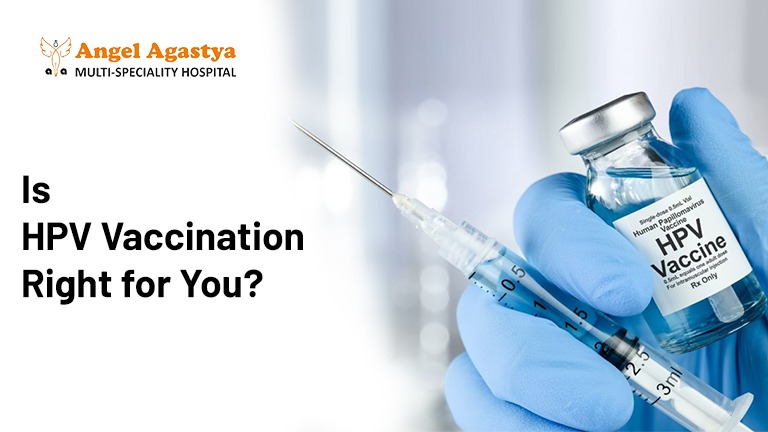
Cervical cancer, the fourth most common cancer in women globally, often traces its roots back to HPV infection. It can also contribute to other cancers, including vulvar, vaginal, penile, anal, and even head and neck cancers. It’s responsible for the unsightly and uncomfortable genital warts.
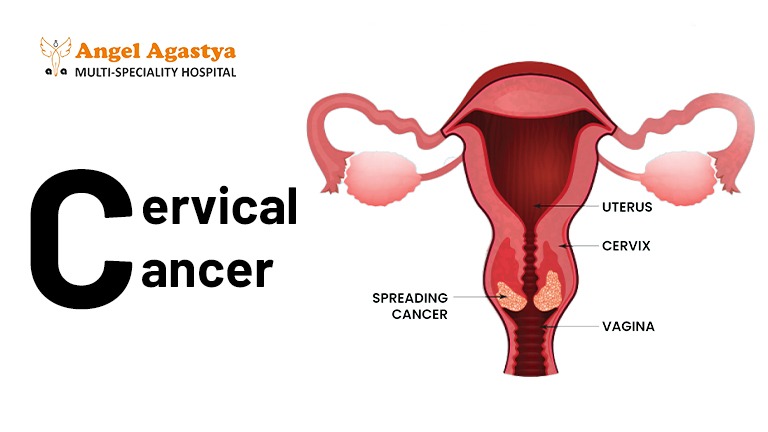
Who Should Embrace the Shield of Vaccination?
The Centers for Disease Control and Prevention (CDC) recommends HPV vaccination for all individuals, starting at the young age of 9 or 45 years old. Early protection is crucial, as it shields individuals before potential exposure.
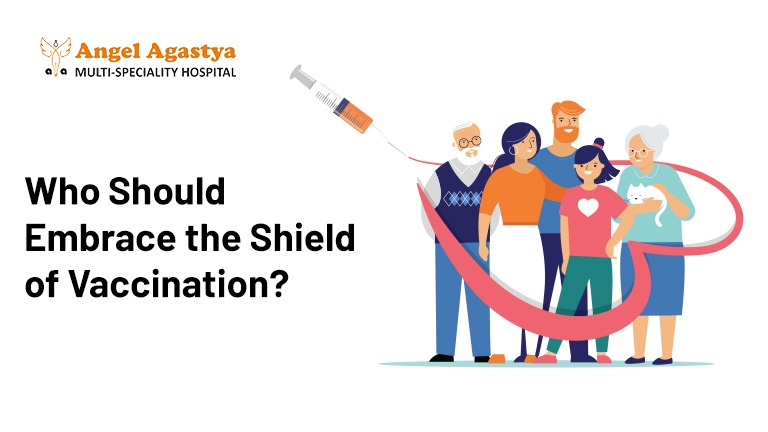
Exploring the Vaccine Shield:
Several types of vaccines are available, each offering varying levels of protection. The quadrivalent vaccine shields against four high-risk HPV types, while the nonavalent vaccine expands its protection to nine types, including those responsible for most related cancers and genital warts.
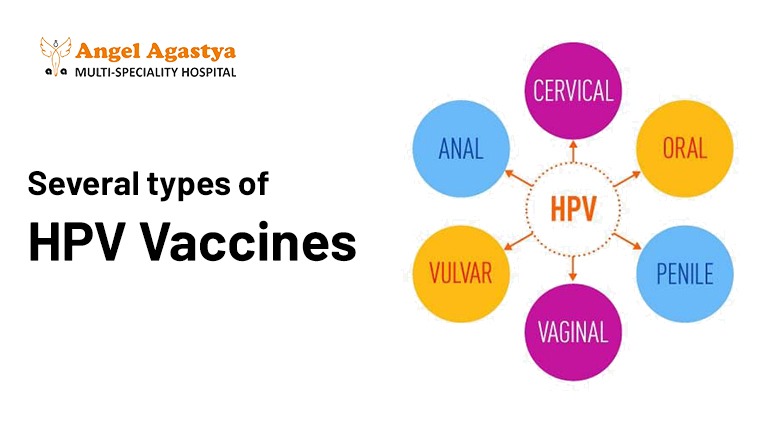
The Dosing Schedule: Timing is Key
The ideal vaccination schedule depends on age. Children and young adults aged 9 -15 years typically receive two doses spaced six to 12 months apart. Older adolescents and adults may require three doses, depending on the chosen vaccine and their age at initiation. Remember, sticking to the recommended schedule ensures optimal protection.
Safety First: Breaking Myths and Misconceptions
The vaccines have undergone rigorous testing and are proven to be incredibly safe. Extensive monitoring by organizations like the CDC and the World Health Organization (WHO) confirms their safety profile. Common side effects like mild pain, redness, or swelling at the injection site are usually temporary and manageable. Don’t let baseless rumors deter you from this crucial preventive measure.
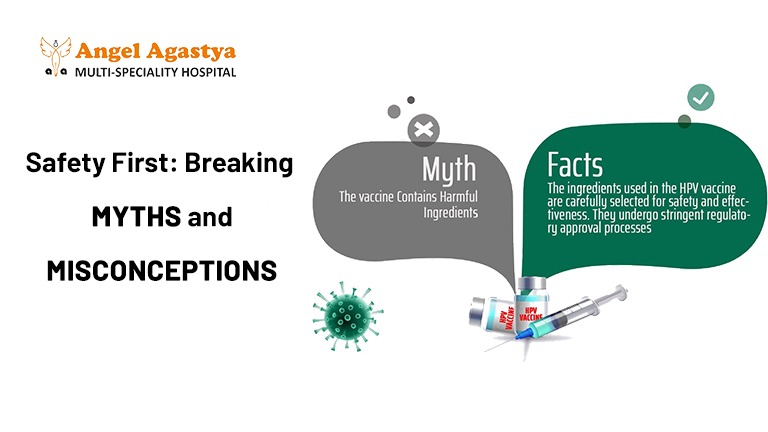
Numbers Speak Volumes: The Power of Protection
The effectiveness of HPV vaccines is undeniable. Studies reveal that they can prevent up to 90% of cervical cancers, significantly reducing the risk of other related cancers and genital warts. Additionally, herd immunity plays a vital role. By choosing vaccination, you not only safeguard yourself but also contribute to a healthier community.
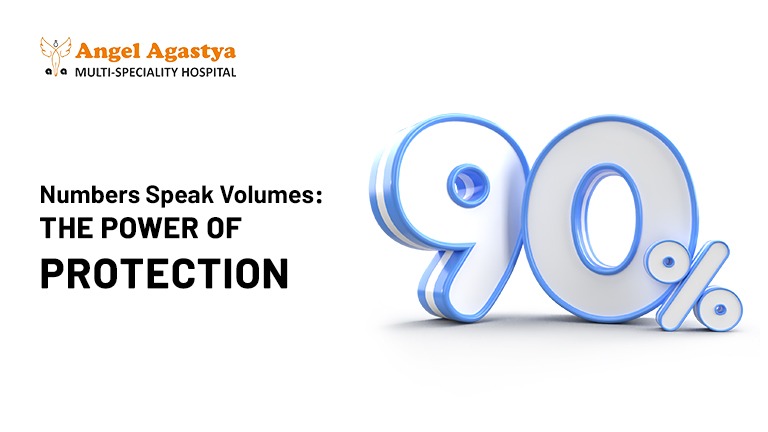
Types of HPV Vaccines:
Human Papillomavirus vaccines are essential tools in preventing HPV infections and associated diseases. There are several types of vaccines available, each offering protection against specific strains of the virus. Let’s explore the differences between these vaccines and their varying levels of protection.
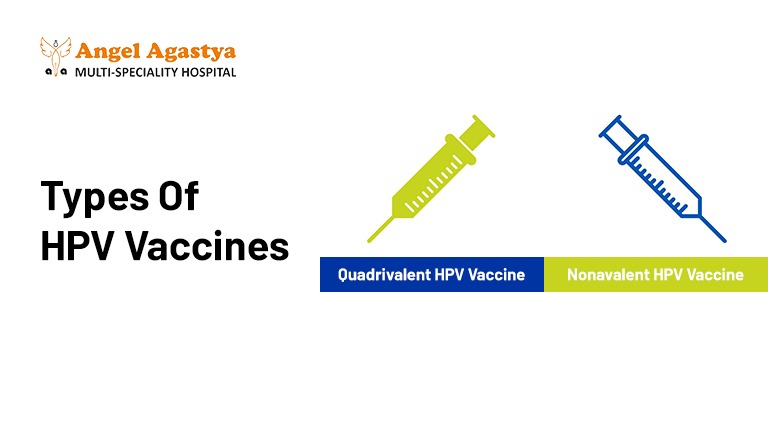
1. Quadrivalent HPV Vaccine:
The quadrivalent vaccine protects against four types: 6, 11, 16, and 18. HPV 16 and 18 are known to cause approximately 70% of cervical cancers and a significant portion of other related cancers.
2. Nonavalent HPV Vaccine:
The nonavalent vaccine protects against nine types: 6, 11, 16, 18, 31, 33, 45, 52, and 58. This vaccine offers broader protection against related cancers, including cervical, vaginal, vulvar, anal, penile, and oropharyngeal cancers. Like the quadrivalent vaccine, the nonavalent vaccine is typically administered as a series of two or three doses.
Differences in Protection:
The primary difference between the quadrivalent and nonavalent vaccines lies in the number of HPV strains they target. While the quadrivalent vaccine protects against four types, the nonavalent vaccine covers nine types. As a result, the nonavalent vaccine offers protection against various related diseases, including certain cancers and genital warts.
Vaccination Schedule and Dosing:
Understanding the recommended number of doses and the ideal spacing between them for the vaccination is essential for ensuring optimal protection against related diseases. Let’s understand the age-dependent dosing recommendations, explore alternative dosing schedules, and address concerns about potential over-vaccination.
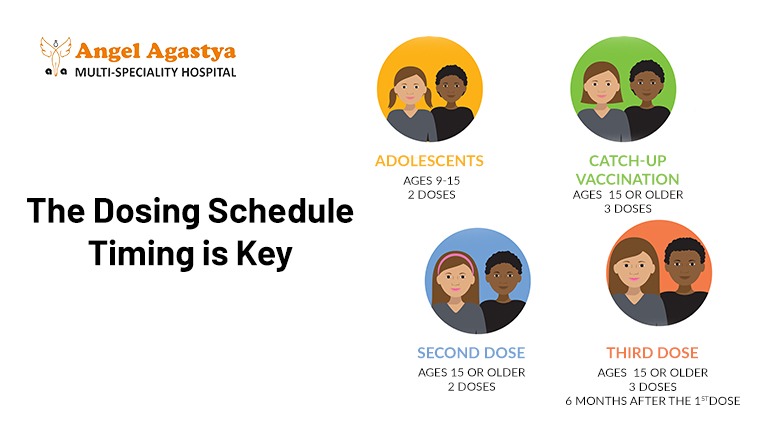
1. Recommended Dosing for Different Age Groups:
The recommended number of doses and the spacing between them vary based on the age of the individual receiving the vaccine:
- Adolescents aged 9 to 15 years old: The recommended vaccination schedule consists of two doses administered at least six months apart. A third dose is necessary if the second dose is administered less than five months after the first dose.
- Catch-up vaccination for individuals aged 15 or older: For those who initiate the vaccine series at age 15 or older, or for those with certain immunocompromising conditions, the recommended vaccination schedule consists of three doses. The second dose should be administered one to two months after the first dose, followed by a third dose six months after the first dose.
2. Alternative Dosing Schedules:
In certain circumstances, alternative dosing schedules may be considered:
Interrupted vaccine series: If the vaccine series is interrupted after the first dose, the series can be completed with the remaining doses according to the recommended schedule, regardless of the time elapsed between doses.
3. Addressing Concerns About Over-Vaccination:
There may be concerns about potential over-vaccination, particularly among individuals who have received doses of the vaccine in the past. However, research indicates that receiving additional doses of the vaccine beyond the recommended series does not pose significant health risks.
Addressing Concerns: We’re Here to Listen
We understand that questions and concerns regarding vaccination are natural. Cost, safety worries, or misinformation might create hesitation. Open communication with your healthcare provider is key. They can address your specific concerns, provide accurate information, and help you make informed decisions tailored to your unique situation. Don’t underestimate the HPV risk! Vaccination offers powerful protection against cancers you might not even consider.
The Final Chapter: Welcome the Power of Prevention
The vaccination is not just a shot; it’s an investment in your future health. By understanding the medical aspects, breaking myths, and accepting the evidence-based benefits, you can make the smart choice to protect yourself and contribute to a healthier community. Remember, knowledge is power, and this blog is just the beginning. Discuss your questions with your healthcare provider, explore trusted resources, and take the first step towards a future free from the shadows of HPV-related diseases.
Summary/Conclusion:
Human Papillomavirus (HPV) is a prevalent sexually transmitted infection with serious health consequences, including cervical cancer, other cancers (such as anal, penile, vaginal, and oropharyngeal), and genital warts. The vaccination serves as a crucial preventive measure against these diseases, stimulating the body’s immune response to the virus. By providing comprehensive information on the vaccination, focusing on its medical aspects, this blog aims to educate readers about the importance of vaccination and empower them to make informed decisions about their health. Understanding the benefits of the vaccination can significantly contribute to reducing the incidence of related diseases and promoting public health.
FAQs
Who should get vaccinated against HPV?
Both males and females are recommended to receive the vaccination aged 9 to 45 years old. In India, only girls/females are recommended while males/boys are optional.
What are the types of HPV vaccines available?
There are two main types: the quadrivalent vaccine and the nonavalent vaccine. The quadrivalent vaccine protects against four types, while the nonavalent vaccine offers protection against nine types. Both vaccines are highly effective in preventing HPV-related diseases.
How effective are the vaccines in preventing HPV-related cancers and genital warts?
HPV vaccines are highly effective in preventing HPV-related cancers, including cervical cancer, as well as genital warts.
What is the recommended age for HPV vaccination, and is there an upper age limit?
For everyone from 9 to 45, it is most effective when administered before potential exposure to the virus through sexual activity.
What are the common side effects of HPV vaccines, and are they serious?
Common side effects of HPV vaccines include pain, redness, or swelling at the injection site, as well as mild fever, headache, or fatigue. Serious side effects from HPV vaccination are rare.
Are HPV vaccines safe for everyone, including adolescents and older adults?
Yes, HPV vaccines are safe for most individuals, including adolescents and older adults.
What is the recommended dosing schedule for HPV vaccination?
Adolescents aged 9 to 15 typically receive two doses of the vaccine, while individuals aged 15 or older may require three doses.
Can individuals receive HPV vaccination if they’ve already been sexually active?
Yes, individuals who have already been sexually active can still benefit from HPV vaccination.
How does HPV vaccination contribute to herd immunity?
HPV vaccination helps to achieve herd immunity by reducing the transmission of the virus within communities. High vaccination coverage rates can effectively limit the spread of HPV infections, ultimately leading to a decrease in the incidence of HPV-related diseases, including cancers and genital warts.
What should individuals do if they have concerns or questions about HPV vaccination?
Individuals with concerns or questions about HPV vaccination should consult a healthcare provider.


I have been suffering from (HPV) disease for the past four years and had constant pain, especially in my knees. During the first year,I had faith in God that i would be healed someday.This disease started circulating all over my body and i have been taking treatment from my doctor, few weeks ago i came on search on the Internet if i could get any information concerning the prevention of this disease, on my search i saw a testimony of someone who has been healed from (Hepatitis B and Cancer) by this Man Dr sikies and she also gave the email address of this man and advise we should contact him for any sickness that he would be of help, so i wrote to Dr sikies telling him about my (Herpes Virus) he told me not to worry that i was going to be cured!! hmm i never believed it, well after all the procedures and remedy given to me by this man few weeks later i started experiencing changes all over me as the Dr assured me that i have cured,after some time i went to my doctor to confirmed if i have be finally healed behold it was TRUE, So friends my advise is if you have such sickness or any other at all you can email drsikies@gmail.com Call or Text him number on whatsapp +2348163430143
order on this website click : https://drsikiesherbalcuremedicine.weebly.com/
Facebook page https://www.facebook.com/doctorsikiesherbs
I seriously love your blog.. Excellent colors & theme.
Did you develop this site yourself? Please reply back as I’m planning to create myy own website
and would love to learn whyere you got this from or just what the thheme is named.
Thank you! https://ukrain-forum.biz.ua/
I seriously love your blog.. Excellent colors & theme.
Did you develop this site yourself? Pleease reply back as I’m planning to create my own website and would love to learn where you got this from or just what the theme is named.
Thank you! https://ukrain-forum.biz.ua/